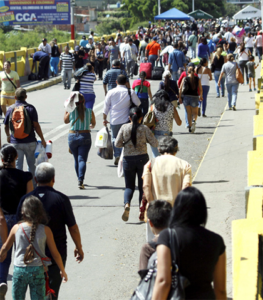Appeal launched to help Venezuelan refugees
International aid agencies have launched an appeal to raise $US1.35 billion to address the humanitarian needs of Venezuelan refugees and migrants in Latin America and the Caribbean.
The United Nations refugee agency UNHCR and the International Organization for Migration (IOM) have launched the appeal to raise funds needed for a regional plan to respond to the desperate situation many Venezuelan refugees and migrants find themselves in and also to assist the communities hosting them.
 Latest estimates say there are approximately 4.6 million refugees and migrants from Venezuela around the world.
Latest estimates say there are approximately 4.6 million refugees and migrants from Venezuela around the world.
Nearly 80 per cent are in Latin American and Caribbean countries – with no prospect for return in the short to medium term.
If current trends continue, 6.5 million Venezuelans could be outside the country by the end of 2020.
The 2020 Regional Refugee and Migrant Response Plan (RMRP) launched in the Colombian capital, Bogotá, is a coordination and a fundraising tool established and implemented by 137 organisations.
These are working across the region, aiming to reach almost four million people – including Venezuelan refugees and migrants and host communities – in 17 countries.
The UNHCR says the RMRP is the result of a wide-ranging field-driven consultation process involving host governments, civil society and faith-based organizations, local communities and donors, as well as refugees and migrants themselves.
“The plan includes actions in nine key sectors: health; education; food security; integration; protection; nutrition; shelter; relief items and humanitarian transport; and water, sanitation and hygiene (WASH). In addition to the emergency response, the 2020 RMRP puts a strong focus on ensuring the social and economic inclusion of refugees and migrants,” A UNHCR spokesperson said.
“Only through a coordinated and harmonized approach will it be possible to effectively address the large-scale needs, which continue to increase and evolve as the current crisis deepens,” he said.
“To this end, the RMRP appeal for 2020 is one of the key instruments to mobilize resource for more collective and concerted action.
“Despite many efforts and other initiatives, the dimension of the problem is greater than the current response capacity, so it is necessary that the international community doubles these efforts and contributions to help the countries and international organizations responding to the crisis.
“More support to governments is needed, with a focus on development concerns in addition to immediate humanitarian needs,” the spokesperson said.
The exodus of migrants from Venezuela has been building toward a humanitarian crisis since last year.
The humanitarian crisis in Venezuela is the result of socioeconomic and political meltdown that began during the presidency of Hugo Chavez has continued into the presidency of Nicola Maduro. It is characterised by hyperinflation, rising hunger, disease, crime and mortality rates, resulting in massive emigration from the country.
The situation is the worst economic crisis in Venezuela’s history and the worst facing a country that is not experiencing war since the mid-twentieth century.
Then crisis’ origins came in June 2010 when Chávez declared an “economic war” due to increasing shortages in Venezuela.
The crisis intensified under the Maduro government, growing more severe as a result of low oil prices in 2015 and a drop in Venezuela’s oil production from lack of maintenance and investment.
The government failed to cut spending in the face of falling oil revenues, and has dealt with the crisis by denying it exists and violently repressing opposition.
Extrajudicial killings by the Venezuelan government became common, with the UN reporting 5,287 killings by the so-called Special Action Forces in 2017, with at least another 1,569 killings recorded in the first six months of 2019.
The US has also cited political corruption, chronic shortages of food and medicine, closure of companies, unemployment, human rights violations and economic mismanagement as playing role in worsening the crisis.












